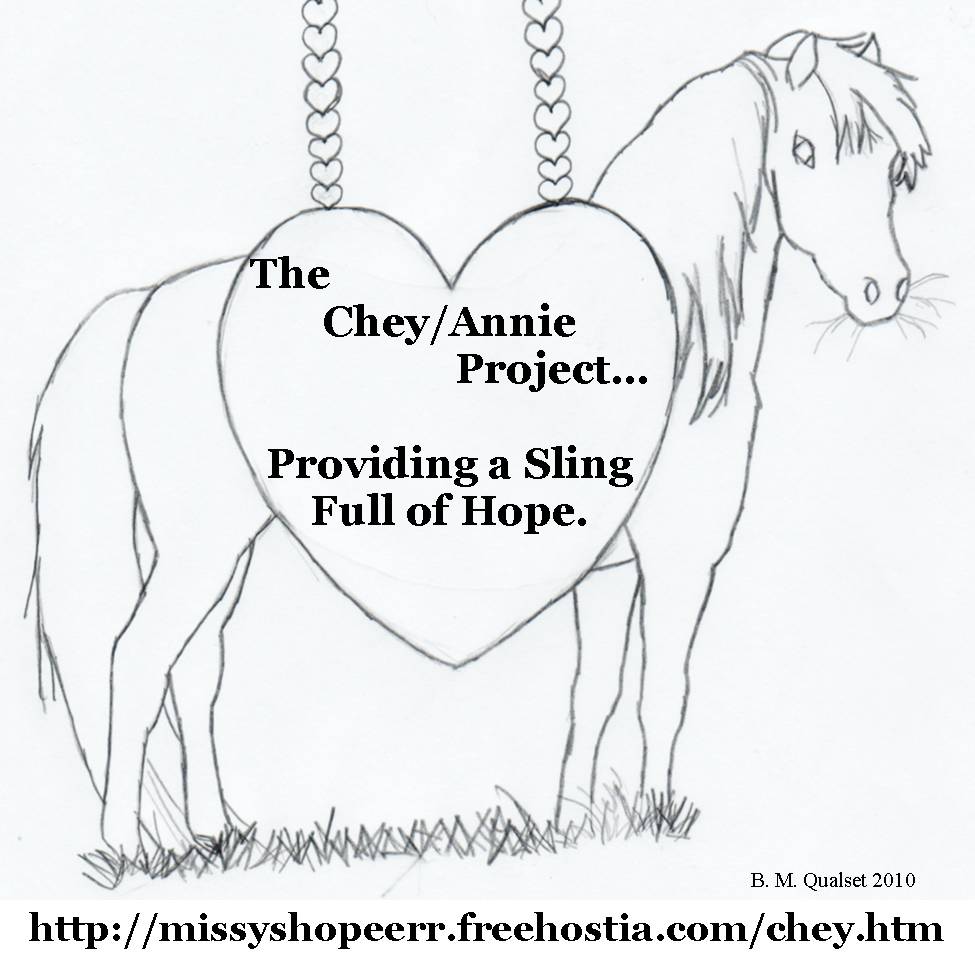|
Home
General Information:
About Us
Contact Us
Mission and Policy Information
In Memory Guestbook
Our Programs:
The Chey/Annie Project
The Chey/Annie Project Fundraisers The Chey/Annie Project Accounting
The Chey/Annie Project Future Sling Locations
Current Sling Locations
Rescue Information:
Rescues In Need Rescues In Need 2
Rescue Fundraisers
Rescue Links
Rescue Links 2 International Rescue Links
Horse and Rescue Updates
Rescue Warnings Resources:
Horse Auctions >Auction Reports
Rescue Resources
Horse Owner Help Resource
Searching For Information Horses Wanted Available Hay Emergency Help Information Equine Services International Equine Services Equine Events Pet Food and Product Warnings and Recalls Congressional Information:
Congressional Information Wild Horse Information
Wild Horse Information 2
Wild Horse Information 3
Letter Writing Campaigns For Horses
Horse Related Petitions
There
Is A Viable Alternative To Equine Slaughter Horse Slaughter Information
Horse Slaughter Information 2
Horse Slaughter Information 3
Horse Slaughter Information 4 Horse Health Information:
Cushings/Insulin Resistance Information Helping Your Horse Prepare For Being Blind
Articles Relating To Equine Blindness Horse Health Alerts
Miscellaneous: PMU Information Other Items >NAIS Information >Helpful Articles >Miscellaneous Information >Horse Rescue Poetry
Nurse Mare Foals
Favorite Yahoo Groups
|
Tips For Finding The Right Rescue
| There is no
governing body for animal rescues; which makes it up to us to look into
a rescue we are considering adopting a pet from or donating a pet to.
Remember to always thoroughly look into a rescue before deciding
to adopt or donate to the rescue. Here
are some tips to help you through this process. |
|
-
Locate
the rescues closest to you. Check
you local phonebooks, online, or talk to people in your area that have
adopted animals in the past.
Remember to talk to several different people. Some people have
personal reasons for making the suggestions that they do. Don't
be afraid to ask questions if they have a negative response to a
certain place. Get the name of the rescue, name of the
owner of the rescue, the location of the rescue, and the phone number.
These will all be needed.
-
Research
the rescue. First contact
your local Animal control or the animal control for that area and ask
if there have been any complaints against the rescue.
Use the Internet for additional resources.
Look into sites such as pet-abuse.com.
These sites have areas where you can type in the name and see
if there is information about the rescue or owners.
Type in the names into search engines, if there has been a
write up about the rescue, it will most likely come up there.
Find out if they are listed as a not for profit organization.
Some rescues do this privately, so they may not be a 501(c)3.
-
Visit
the rescue in person if possible.
This is one of the best ways to find out about the rescue.
See how the animals react to the caretakers.
See the conditions of the animals, the availability of food and
water, the availability of shelter, and anything else that you can
think of that the animals need. Remember,
most of these organizations are not for profit.
The shelters may not be perfect, but they are working on them.
Feel free to ask the owner of future plans for the rescue.
Most are willing to talk about repairs they would like to make
or additions that they are planning.
Also remember that some of the animals may have been there for
a very short time. Be
sure to ask how long some of the animals have been there, especially
if you are concerned about their condition.
Animals that are being adopted out should be in good health, up
to date on vaccinations, and have their feet cared for.
-
Find
out about the adoption process. Find out if they are willing to
take the animal back if there is a problem. Find out if they
have a contract, an application form, or if they require a home
visit. Some will also require a vet reference or a personal
reference. It is best to use a personal reference who is not
related to you if possible.
-
Ask
for references. They
should be willing to provide references from their vet, farrier (if it
is an equine rescue), and people who have previously adopted from
them.
-
Call
the references. Ask
questions. See if they
are related to the owner or friends of the owner.
See what their experience has been with the rescue.
-
If
you see something that does not seem right, do not be afraid to
contact animal control. It
is better to err on the side of caution than to turn a blind eye to
neglect
|
|
If you have followed the steps above, and feel good about the rescue,
start looking into the animals they have available for adoption.
They may have the friend that you have been looking for.
Good
luck in your search!
Written by Brandi M. Qualset, 2007 |
|
|
|

